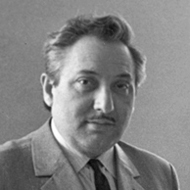Compositions
| Composition | Creation year | Recording |
Score available in HIS |
Score available in ČRo |
|---|---|---|---|---|
|
Succession I.
for bass clarinet and piano |
||||
|
Pražská domovní znamení
Cyklus písní pro soprán a klavír na texty básní Vít. Nezvala |
tau21
|
|||
|
Preludium - Sarabanda - Postludium
pro symfonický dechový orchestr |
1968 |
1553
|
||
|
Promiňte, Mistře...
malé rondo |
tau14
|
|||
|
Quatro nuances (Čtyři odstíny)
pro flétnu, harfu, housle, violu a violoncello |
1978 | |||
| Setkání ve svobodném máji |
6325
|
|||
|
Sinfonia Bohemica, for solo bass, mixed choir and orchestra
pro sólo bas, smíšený sbor a orchestr |
tau19
|
6338
|
||
|
Sinfonia Slovacca
pro velký symfonický orchestr |
tau20
|
55
|
||
| String Quartet No. 3 |
tau12
|
0636-40, 5305
|
||
| Sonata for violin and piano | 1954 |
tau22
|
||
| Sonata for clarinet and piano | 1975 |
tau23
|
01228-30, 04277
|
|
| Sonata for piano |
617
|
|||
| Sonata for viola and piano | 1954 |
2981
|
||
|
Sonatina emancipata
pro trubku a klavír |
tau24
|
1992
|
||
| Sonatina pro hoboj a klavir |
tau25
|
0334-9
|
||
|
Správná věc
Vokálně-symfonický obraz |
1342
|
|||
|
Starojaponská pětiverší
Cyklus milostných písní |
08239
|
|||
|
Struktury
pro smyčcové kvarteto |
0389
|
|||
| Tri odstiny |
02558
|
|||
| Tři smíšené sbory |
tau27
|

